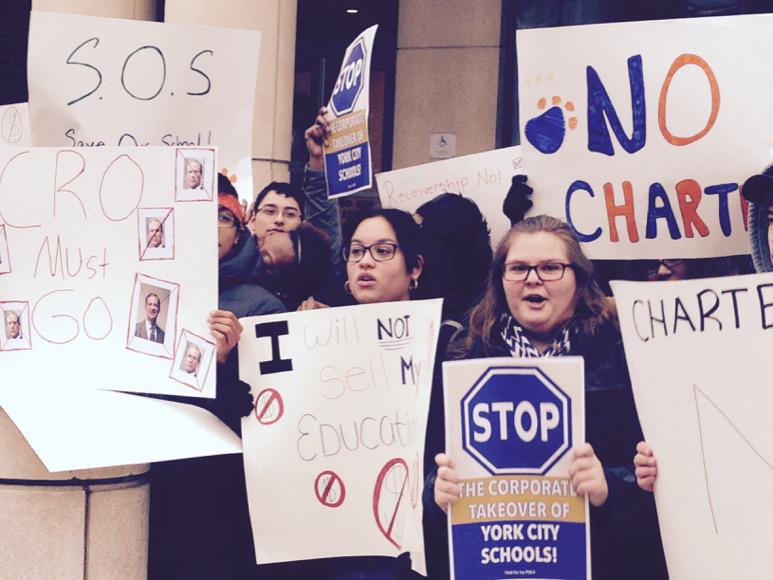Judge will decide York schools’ fate
Listen
High school students in the city of York protest the potential state takeover and forced charterization of their school district. (Emily Previti/WITF)
A judge is scheduled to rule on the state’s petition for a receivership Monday.
The Pennsylvania Department of Education has filed a petition for a receivership of York City School District with the York County Court of Common Pleas.
If Judge Stephen Linebaugh rules in the state’s favor, the district could be Commonwealth’s first to be forced to charterize and among just a few nationally to undergo the process on a wide scale.
Outside the courthouse earlier this week during an intervention hearing for the case, about 40 high school students protested against the potential takeover of their school district as snow fell outside the courthouse. High school senior Ashlee DeSantis was one of them. “This is to show anybody who’s driving by, the CRO, anybody in the community to show them we actually do care, we care about our school, we love our school and we love public school. We don’t want receivership to happen here,” DeSantis said.
York is one of four of the Commonwealth’s poorest, worst-performing public school systems involved in the state’s Act 141 recovery process.
The state took the issue to court instead of giving the school board more time to vet the charter company that might end up educating the struggling city’s children. Department of Education spokesperson Tim Eller says the push comes after more than two years of working with board members on the district’s chronic financial and academic problems. “The board is signaling in the decisions it’s making, and delays it’s taking, that it’s not serious in focusing on what’s best for the students,” Eller said.Here’s how Act 141 is supposed to work: The state installs a chief recovery officer, who helps script a plan to cut costs and improve academics. The officer does that with input from staff, teachers, parents and the elected school board – which still has autonomy, albeit curtailed. If the board doesn’t approve the plan, it loses its power to a state receivership. But with an approval, the board maintains limited authority and gets an interest-free loan. York secured $3 million that way. Yet 18 months later, the district faces a receivership. “The recovery plan the board itself approved a year and a half ago, did have a contingency plan, if you will, for the charterization,” Eller said. But state law requires board approval of charter school operators. And York’s has refused to vote on an agreement with Charter Schools USA because of concerns about the company’s for-profit status and choosing nonresidents to provide oversight.
Critics say the company’s proposal is ill-informed, too. Teachers meanwhile balked at a contract calling for pay cuts of 40 percent over four years, even though that worst-case scenario was reflected in the recovery plan signed by union president Bruce Riek. “Honestly, I don’t think anybody thought it would get to that point. We thought various things we were doing, we’d get to the point where that just wasn’t needed,” Riek says.
The school board ultimately asked for more time to hold a public hearing where Charter Schools USA could answer questions. That’s not a rejection, but it’s also not the vote requested by York’s Chief Recovery Officer David Meckley. And the board approved a new teachers’ contract, but concessions were less than what’s in York’s plan. Under Act 141, any noncompliance is grounds for a receivership, so long as Commonwealth Court in the district’s home county agrees. Pennsylvania School Boards Association attorney Michael Levin acknowledges Act 141 limits school boards’ autonomy – to a point. “That doesn’t mean you get a receiver when the CRO asks you to do something that’s unlawful and half-assed, which is what happened in this case,” Levin says. Levin also says state law requires public vetting of charter proposals and other options for students who don’t want to go to a charter school. Michael Churchill, attorney for the Public Interest Law Center of Philadelphia, says those other options seem like they’d be close to impossible under what’s currently proposed for York. “There’s no provision for them to keep enough funds to provide alternative schools for students who don’t want to go to the charter,” Levin says. Critics also say the state is rushing to wrap up before Gov.-elect Tom Wolf, who’s from York County and opposes full charterization, takes office. Eller denies that.
York City School District tried to get the courts to delay proceedings until Jan. 30 – after Wolf begins his term.
Judge Linebaugh denied that motion, however, and is scheduled to rule Monday on the state’s receivership petition.
Editor’s note: This story has been updated to reflect the outcome of court proceedings Thursday.
WHYY is your source for fact-based, in-depth journalism and information. As a nonprofit organization, we rely on financial support from readers like you. Please give today.



